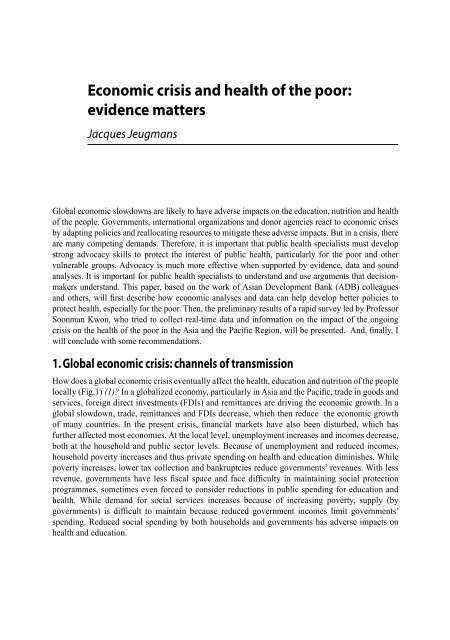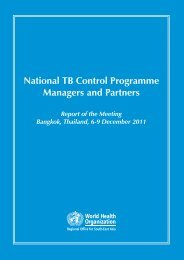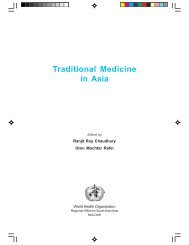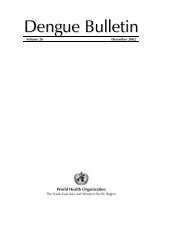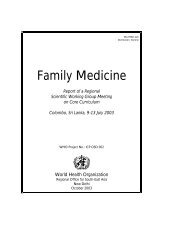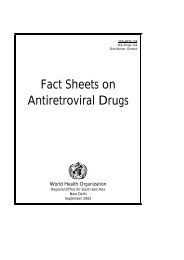South-East Asia Regional Conference on Epidemiology
South-East Asia Regional Conference on Epidemiology
South-East Asia Regional Conference on Epidemiology
You also want an ePaper? Increase the reach of your titles
YUMPU automatically turns print PDFs into web optimized ePapers that Google loves.
Ec<strong>on</strong>omic crisis and health of the poor:<br />
evidence matters<br />
Jacques Jeugmans<br />
Global ec<strong>on</strong>omic slowdowns are likely to have adverse impacts <strong>on</strong> the educati<strong>on</strong>, nutriti<strong>on</strong> and health<br />
of the people. Governments, internati<strong>on</strong>al organizati<strong>on</strong>s and d<strong>on</strong>or agencies react to ec<strong>on</strong>omic crises<br />
by adapting policies and reallocating resources to mitigate these adverse impacts. But in a crisis, there<br />
are many competing demands. Therefore, it is important that public health specialists must develop<br />
str<strong>on</strong>g advocacy skills to protect the interest of public health, particularly for the poor and other<br />
vulnerable groups. Advocacy is much more effective when supported by evidence, data and sound<br />
analyses. It is important for public health specialists to understand and use arguments that decisi<strong>on</strong>makers<br />
understand. This paper, based <strong>on</strong> the work of <str<strong>on</strong>g>Asia</str<strong>on</strong>g>n Development Bank (ADB) colleagues<br />
and others, will first describe how ec<strong>on</strong>omic analyses and data can help develop better policies to<br />
protect health, especially for the poor. Then, the preliminary results of a rapid survey led by Professor<br />
So<strong>on</strong>man Kw<strong>on</strong>, who tried to collect real-time data and informati<strong>on</strong> <strong>on</strong> the impact of the <strong>on</strong>going<br />
crisis <strong>on</strong> the health of the poor in the <str<strong>on</strong>g>Asia</str<strong>on</strong>g> and the Pacific Regi<strong>on</strong>, will be presented. And, finally, I<br />
will c<strong>on</strong>clude with some recommendati<strong>on</strong>s.<br />
1. Global ec<strong>on</strong>omic crisis: channels of transmissi<strong>on</strong><br />
How does a global ec<strong>on</strong>omic crisis eventually affect the health, educati<strong>on</strong> and nutriti<strong>on</strong> of the people<br />
locally (Fig.1) (1)? In a globalized ec<strong>on</strong>omy, particularly in <str<strong>on</strong>g>Asia</str<strong>on</strong>g> and the Pacific, trade in goods and<br />
services, foreign direct investments (FDIs) and remittances are driving the ec<strong>on</strong>omic growth. In a<br />
global slowdown, trade, remittances and FDIs decrease, which then reduce the ec<strong>on</strong>omic growth<br />
of many countries. In the present crisis, financial markets have also been disturbed, which has<br />
further affected most ec<strong>on</strong>omies. At the local level, unemployment increases and incomes decrease,<br />
both at the household and public sector levels. Because of unemployment and reduced incomes,<br />
household poverty increases and thus private spending <strong>on</strong> health and educati<strong>on</strong> diminishes. While<br />
poverty increases, lower tax collecti<strong>on</strong> and bankruptcies reduce governments’ revenues. With less<br />
revenue, governments have less fiscal space and face difficulty in maintaining social protecti<strong>on</strong><br />
programmes, sometimes even forced to c<strong>on</strong>sider reducti<strong>on</strong>s in public spending for educati<strong>on</strong> and<br />
health. While demand for social services increases because of increasing poverty, supply (by<br />
governments) is difficult to maintain because reduced government incomes limit governments’<br />
spending. Reduced social spending by both households and governments has adverse impacts <strong>on</strong><br />
health and educati<strong>on</strong>.


